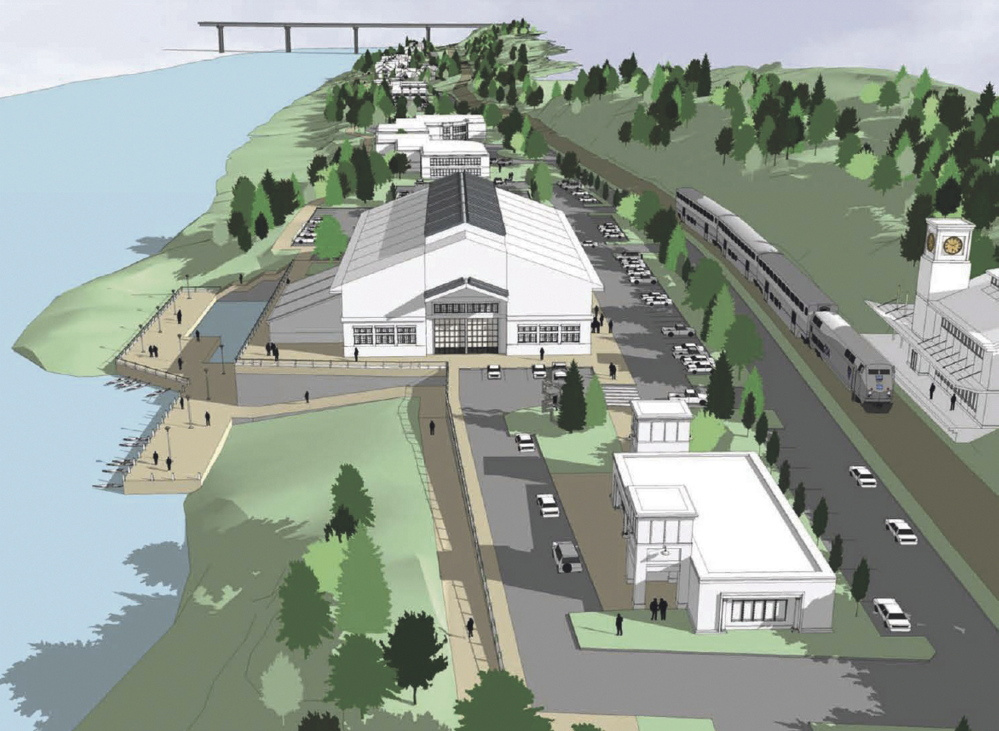AUGUSTA — A developer has asked the city about the possibility of building housing at the former Statler mill site, which the city has dubbed the Kennebec Lockes and hopes to have redeveloped.
While city officials still hope for a proposal for some sort of private commercial development at the approximately 20-acre site with about a mile of frontage on the Kennebec River, a 2012 master plan for the vacant, city-owned property did include some housing on the site.
City councilors are scheduled to discuss whether they’re interested in exploring such a proposal for housing at the site at their meeting Thursday.
City Manager William Bridgeo said a city staff member received a “discreet inquiry” from a potential developer who wished not to be identified publicly, asking if the city would be interested in a proposal to develop housing at the former mill site. The city acquired the site because of nonpayment of taxes and had the former mill buildings razed several years ago.
Bridgeo said such a decision should be made by councilors, not him. He said issues to be considered could include where on the property housing might be located and whether the city would be prepared to make an investment in infrastructure at the site, such as for roads, for a housing project.
Agreeing to have some housing on the site wouldn’t mean the city is giving up on finding a developer to build a more commercial project there. City officials have long suggested the site would lend itself to a riverfront brew pub, or perhaps a mixed-use retail project. While the city has received a few inquiries from potential developers, nothing has materialized and the site remains vacant.
The 2012 master plan for the site included a large pavilion with an open urban-style market, a passenger train station, a restaurant or brew pub, townhouses, and retail shops.
“I think the overall master plan is sound. We’d love to see some commercial activity modeled after, for example, (Thompson’s Point in Portland) or the waterfront in Bangor,” Bridgeo said. “We’ve had some feelers extended, on the commercial side. But at the moment, we’ve had no proposals, but for some who’ve done some tire-kicking.”
The city took the property for nonpayment of taxes in 2009. Since then, with state and federal environmental officials and funding, it has had pollution, including PCBs from transformers that overflowed into the ground, at the site cleaned up.
Councilors are scheduled to discuss the issue at their 6:30 p.m. meeting Thursday, in the council chamber at Augusta City Center.
Councilors also are scheduled to discuss what to do with two 17-passenger 1994 “trolley” buses that the city purchased as surplus property from the state in 2002, at a cost of $2,400. Over the years the city has used them during special events — shuttling people to Fourth of July activities, for example — but they were taken out of service in 2012 because they needed repairs to address safety concerns.
City administrators had planned to try to sell the trolleys, but Ward 4 City Councilor Anna Blodgett asked officials last year to look into whether one of the trolleys could be fixed, perhaps using the other trolley for parts, and once again used by the city to provide rides at special events.
The city staff estimated it would cost about $40,000 to get one of the trolleys back on the road in good condition. But they warned that whoever drives them would need a special endorsement for passenger vehicles on his or her driver’s license, and the city might not have any employees qualified to drive such a vehicle. They also noted the city could rent trolleys, or continue, as it has done in recent years for the Fourth of July and the holiday tree lighting, have two horse-drawn hay wagons on hand to provide rides at special events, for $1,000 per event.
In addition, councilors are scheduled to discuss hiring a mediator in the latest effort to resolve a long-running dispute between the owner of a controversial quarrying operation in a pit off West River Road and members of the nearby Grandview neighborhood.
Neighbors have complained that blasting in the pit disrupts their lives, damaged their homes and reduced their property values.
Meanwhile, officials of the company that owns the pit, McGee Construction, have said recent city proposals to restrict activities further there would make it impossible for that part of the business to remain financially viable.
Late last year city officials agreed to postpone any changes in blasting rules until the city staff could look for potential solutions. Since then, Mayor David Rollins has proposed forming a council committee to study the issue and make a recommendation.
At-Large Councilor Mark O’Brien recently suggested the city consider hiring a professional mediation service to work with the Grandview neighbors and pit owner Steve McGee in an attempt to resolve their differences.
Bridgeo said he was unsure what that would cost but that cost would be considered, if councilors express interest in hiring a mediator, before moving forward with any such proposal.
Keith Edwards — 621-5647
Twitter: @kedwardskj
Send questions/comments to the editors.



